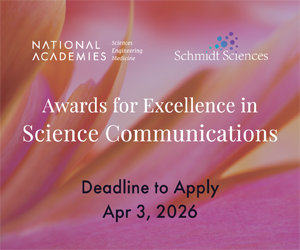Mobilizing to cover a complex, breaking story on the other side of the world is never easy. Doing it when reliable sources are clamming up is even harder. In this except from the Summer 2011 ScienceWriters, Joe Palca discusses how National Public Radio covered Japan's earthquake, tsunami, and nuclear meltdown.
Science writing news
Microbiologist Rosie Redfield is trying to replicate that arsenic bacterium study in public, a blogging watershed. Yes, gene therapy for leukemia looks promising indeed, but the new small study awaits replication. Gay's end? Why same-sex marriage could eradicate homosexuality. Plus, get your Google+ invite here, Take 2.
Americans paid dearly for the space shuttle. Was the investment worth it? George Alexander, who covered the shuttle for the Los Angeles Times from the project's initiation in 1972 until 1985, reviews the evidence for and against that proposition. Excepted from the Summer 2011 ScienceWriters.
Birth control is free at last — a year from now. It includes sterilization and probably the coming contraceptives for men. The death of Amy Winehouse, addiction, and withdrawal from alcohol. How will the debt-ceiling legislation affect science and medicine?
In the past seven months since we first announced our Idea Grants program, the National Association of Science Writers has awarded five grants, totaling $72,400. Funding is provided by income from the Authors Coalition, and the grants are intended to help science writers in their professional lives or benefit the field of science writing.
Neuroscience explains the debt-limit crisis for you. The incredible shrinking brain. Is there life beyond Earth? Perhaps not. Protecting human research subjects. Find the Higgs boson at home in your spare time! Correction %^(. Human embryonic stem cells get their day in court.
Height and hormones. Should birth control be free? Does coffee prevent Alzheimer's disease? Should medical journalists be advocating early mammograms? Competition alert: Ed Yong is now a full-time freelance, gulp. Get your Google+ invite here.
Personal blogging is dead because of Google+. Or not. By faking a vaccination program, the CIA gets bin Laden family DNA. Or not. In any case, public health authorities are outraged and fear more anti-vaccine propaganda.
SciAm's new blog network is up, with 55 swell bloggers. How can the rest of us get any work done? A new autism twin study says environment matters more than genes, but others don't agree. Does which one matters more really matter?
The World Conference of Science Journalists meets, greets, and tweets. Free E. coli papers. Pharma STEPS toward getting docs to prescribe more drugs. Drug effects in the elderly. New blogs from Kaiser Health News, JAMA, and Laura Newman.


